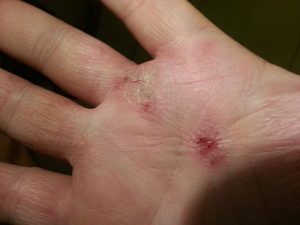Skin allergies are the most common in humans. However, they also appear in the greatest variety, often with significant differences among them. For this reason, it’s important to learn a bit more about the main causes, symptoms, and treatments for each one. That way, it’s also easier to understand when self-care is no longer enough and when it’s time to seek medical help. And these are exactly the reasons why we will talk about atopic dermatitis in today’s text. Want to know how it presents itself and how you can treat it? Find out now!
What is Atopic Dermatitis?
Atopic dermatitis can be defined as a chronic inflammatory skin disease, much more common in children, especially in their first year of life. Although less frequent, it can also affect teenagers and adults. In most cases, this type of allergy shows up as reddish lesions that may have scaling on the face, chin, forehead, and even the scalp. When it appears in older individuals, it can also affect other parts of the body such as the elbows, neck, torso, hands, and even the feet. Atopic dermatitis usually occurs in stages. Initially, in the mild stage, the symptoms are less noticeable and hardly cause discomfort. In the acute stages, this type of allergy can present several more serious symptoms, which may worsen if they appear again.
Symptoms of Atopic Dermatitis
Like many other types of allergies, it usually presents specific signs that help identify it more easily. Some of the main symptoms of atopic dermatitis are:
- Dry skin
- Red, itchy patches
- Scaling in certain areas of the skin
- Skin swelling
- Crusts on the skin
As we’ve mentioned, atopic dermatitis often appears in phases and at certain times, which means these symptoms may present more mildly or severely depending on the phase the condition is in. Regardless, it’s always important to treat the condition so that no complications arise.
Causes of Atopic Dermatitis
Atopic dermatitis can be related to several causes, just like other skin allergies, and therefore it is practically impossible to identify just one. The main ones include:
- Food intake
- Very hot and long showers
- Genetic predisposition
- Contact with chemicals
- Sweating
- Contact with animals
- Extremely hot or cold environments
- Certain types of soap
The fact that this type of allergy is so broad makes it difficult to identify its causative agent. Therefore, to make this task easier, it’s important to also know what risk factors increase the likelihood that a person will develop this type of allergy. 
Risk Factors
Some of the risk factors that may contribute to the development of atopic dermatitis are:
- Family history of this type of allergy
- Allergic rhinitis
- Asthma
- Allergy to pollen or animal hair
- Other skin allergy manifestations
Of course, being part of this risk group does not necessarily mean a person will develop atopic dermatitis, only that the chances are higher. Often, for example, when a person has an allergic rhinitis attack, atopic dermatitis also flares up, indicating a shared causative agent.
How Is the Diagnosis Made?
The diagnosis of atopic dermatitis is made by checking the lesions, asking a series of questions about family history, for example, and sometimes through tests, if needed. From this, a doctor can prescribe the right treatment by knowing it is exactly this type of allergy.
Treatment of Atopic Dermatitis
The treatment of atopic dermatitis begins primarily to relieve the symptoms that appear during the acute phase. To do this, a doctor usually prescribes corticosteroids, which relieve symptoms quickly. The second step is to identify the causative agent or agents of the allergy. Once this investigation is done, the doctor may recommend several steps such as changing the type of soap used during showers, changing the type of pillow you sleep on, and even changing your diet, in some cases. Since this is a disease that does not have an exact cure, the main goal of the doctor is to prevent its acute stages from manifesting.
When to See a Doctor?
As we mentioned earlier, atopic dermatitis is not exactly a serious problem, but it can be quite uncomfortable. Therefore, the recommendation is that when it starts to interfere with daily activities, you should seek medical help so that your symptoms can be controlled. Besides helping to relieve symptoms immediately, a doctor can also help you prevent more acute phases of atopic dermatitis from occurring. Many people believe that skin allergies are not serious issues and, for that reason, do not require much care. However, as you may have noticed in today’s article, problems such as atopic dermatitis can disrupt our lives in many ways. And that’s why it’s important not only to know how to identify them but also to understand how to prevent such problems from affecting us or to treat them from the very beginning. This way, the effects will definitely be smaller and we’ll be able to live without major complications.











